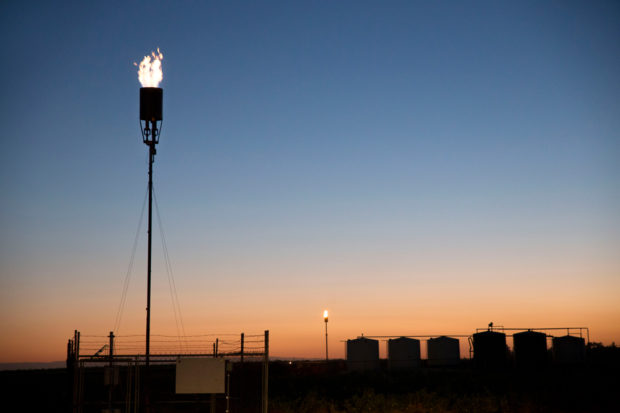
By Vic Bedoian
In July, the City of Arvin made a decision that could become a landmark of environmental justice throughout the state. The City Council passed an ordinance regulating oil-drilling activities. It was the result of a campaign led by Arvin residents and aided by the Center on Race, Poverty and the Environment (CRPE) to help improve the quality of life and health for Arvin residents. Environmental justice advocates hailed the victory, hoping the decision might pave the way for other California cities to take similar action in protecting the well-being of residents affected by industrial pollution.
Arvin is an industrial town of 20,000 people about 20 miles southeast of Bakersfield. Situated among Kern County’s factory farms and oil fields, it’s often pointed to as to as the place with the highest air pollution readings in the nation. Last month, the City Council enacted a new ordinance regulating where oil wells can be drilled along with other reforms.
Now Arvin is perceived as a possible beacon for other cities to follow. It happened because residents organized and acted out of concern for their own health and well-being. They were aided by the CRPE, a prominent statewide environmental justice group.
Juan Flores, a Delano-based activist for the group, explained how it happened, “Well you know, one of the main complaints of people in these communities in Kern County is this feeling of always being invaded by an industry that knows no boundaries, of looking forward to the profit and not the well-being of the community.”
It all began in 2014 when an underground pipeline began leaking gas and resulted when residents of the Nelson Court neighborhood were forced to evacuate their homes. The leak was never found and residents were never compensated for the financial or health impacts they suffered.
Flores says the oil executives were caught flat-footed, “The main issue was [that neither] the city nor the county had the right map showing the pipeline was leaking underneath the homes. In the beginning, it raised a whole bunch of issues. I mean families had been exposed to these gases for days, even weeks.”
That incident shocked the people of Arvin into action and brought into focus the overall impacts of oil production such as having wells drilled in close proximity to homes and the truck traffic, air pollution and bad smells that affected their daily lives. Residents decided to do something about it.
Flores says that’s when the CRPE stepped in with resources to help residents organize a campaign. The CRPE organizer saw that residents already had a sense of their own empowerment, “Here we are, we’re the majority of us, a great majority of us want the ordinance to come forward. And then the City Council opened it up, they got their legal counsel and said all right how can we make this better?”
Flores asserts that passing the new ordinance was a truly volunteer effort by Arvin’s residents. He says the community saw the problem as something they should solve for themselves: “That ordinance proved that communities can get it organized, can get educated, and can have their local elected officials represent them truly and not represent the interests of an industry.”
The new ordinance applies only to future oil drilling. Existing wells are grandfathered in. The oil industry opposed the ordinance, portraying the proposed regulations as a ban on oil drilling and calling the move an assault on the county’s major industry.
In reality, the reforms are modest. They prohibit the location of new oil and gas sites within the city’s residential, mixed-use, commercial and open space zones; they require new oil and gas sites to be located more than 300 feet from residences, schools, hospitals and parks; and they implement other requirements related to public health and environmental impacts associated with oil and gas operations.
Juan Flores predicts that despite widespread support, the industry will push back, “Real legal challenges are coming forward, which are how do we defend this ordinance. The oil industry is going to do all it can to try to diminish it or erase it, but we’re very confident that this ordinance is going to prevail and is going to set a precedent for the state of California.”
California Attorney General Xavier Becerra expressed strong support for passage of the ordinance and applauded Arvin’s decision to protect people’s health and safety. Arvin Mayor Jose Gurrola is ready to defend the new rules. He recently joined more than a hundred local officials around the state who signed a letter to Governor Jerry Brown asking the state to phase out production of fossil fuels.
*****
Vic Bedoian is an independent radio and print journalist working on environmental justice and natural resources issues in the San Joaquin Valley. Contact him at vicbedoian@gmail.com.
